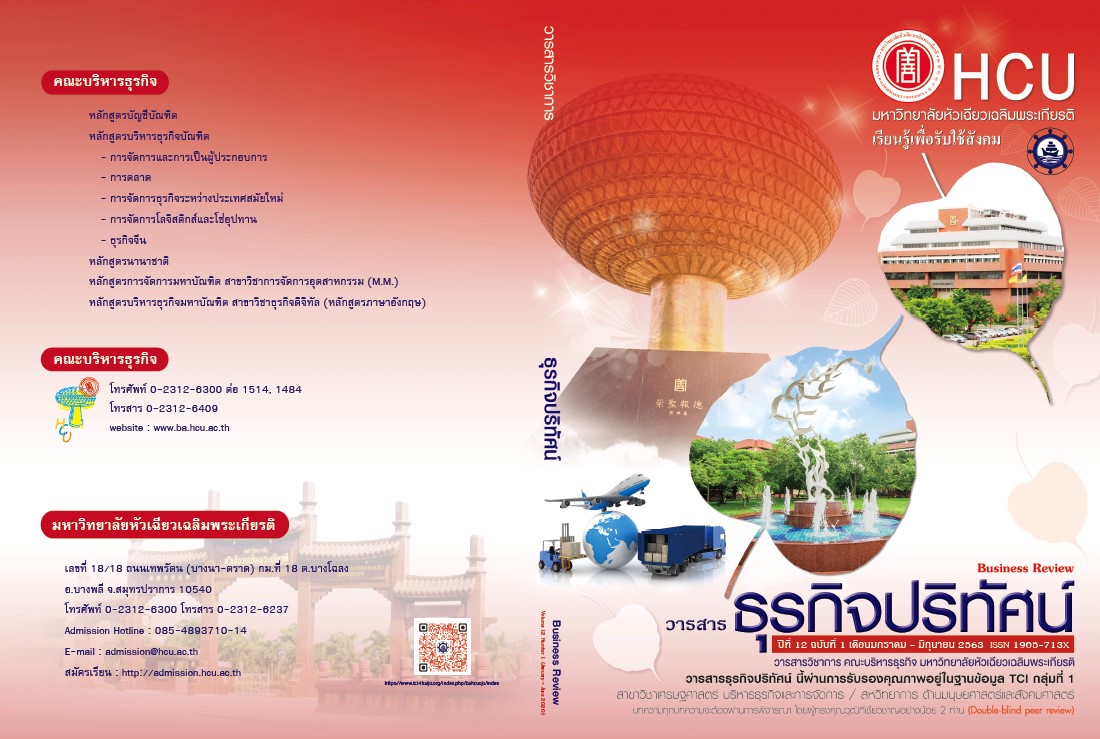THE EVALUATION OF ORGANIZATIONAL CULTURE COMMUNICATION THROUGH BOARD GAME ACTIVITY
Keywords:
Evaluation, Board Game, Communication, Corporate Culture, Learning ActivityAbstract
The purpose of this research is to evaluation board game activity to communicate corporate culture. The research applied qualitative research to assess 8 factors of success. The data collected by review documentary and in-depth interview all stakeholders i.e. 3 facilitators, 6 participants, and 2 supervisors of participants.
Overall results revealedthe factor of success composed of (1) content (2) material (3) learning methodology (4) environment (5) learning approach. On contradictory, the failure factors came from (1) learning objective (2) instructor/facilitator capability from in an adequate selection process(3) and how to implement in theworking environment, asparticipants were not informed clearly about purpose andthe long-term impact, thus the activity may not meet the same expectation.
References
ปรีชาเอกคุณากูล. (2559). วันนี้กับคุณปรีชาเอกคุณากูล. วารสารภายในองค์กรCPN,9(3), 2.
พงศ์ศิริสุขประวิทย์ และมณฑลสรไกรกิติกูล. (2560). ผู้ส่งเสริมการเรียนรู้ : บทบาทในการสร้างเสริมการเรียนรู้องค์การภาครัฐ. วารสารHR Intelligence, 12(2), 27-46.
พีระพงษ์ เอื้อสุนทรวัฒนา. (2560). บทบาทของผู้นำในการบริหารธุรกิจ. วารสารบริหารธุรกิจปริทัศน์, 9(2), 1-6.
เยาวดีรางชัยกุลวิบูลย์ศรี. (2556). การประเมินโครงการ: แนวคิดและแนวปฏิบัติ.พิมพ์ครั้งที่ 2. กรุงเทพฯ: สำนักพิมพ์แห่งจุฬาลงกรณ์มหาวิทยาลัย.
วิรัชสงวนวงศ์วาน. (2547). การจัดการและพฤติกรรมองค์การ.พิมพ์ครั้งที่ 2. กรุงเทพฯ: เพียร์สันเอ็ดดูเคชั่นอินโดไชน่า.
วิวัลย์ดาสิริชีวานันท์. (2556). การพัฒนาตัวบ่งชี้สมรรถนะหลักของวิทยากรกระบวนการในงานสาธารณสุขการวิเคราะห์ความตรงเชิงประจักษ์และความไว.ดุษฎีนิพนธ์ปรัชญาดุษฎีบัณฑิต (วิจัยวัดผลและสถิติการศึกษา), มหาวิทยาลัยบูรพา.
สมคิดพรมจุ้ย. (2542).เทคนิคการประเมินโครงการ.นนทบุรี: สำนักพิมพ์มหาวิทยาลัยสุโขทัยธรรมาธิราช.
สุภางค์จันทวานิช. (2556). การวิเคราะห์ข้อมูลในการวิธีการวิจัยเชิงคุณภาพ.กรุงเทพฯ: สำนักพิมพ์แห่งจุฬาลงกรณ์มหาวิทยาลัย.
โสภิตแกล้วกล้า. (2551). ศึกษาการประเมินผลการบำบัดรักษาด้วยโปรแกรมจิตสังคมบำบัดของคลินิกบำบัดการติดยาเสพติดสำนักอนามัยกรุงเทพมหานคร.สารนิพนธ์สังคมสงเคราะห์มหาบัณฑิต,มหาวิทยาลัยธรรมศาสตร์.
โสมจุฑาจันทร์เจริญ. (2556). การสื่อสารวัฒนธรรมองค์การของบริษัทไพร้ซวอเตอร์เฮ้าส์คูเปอร์ส (PwC) ประเทศไทยจำกัด.สารนิพนธ์วารสารศาสตรมหาบัณฑิต (การจัดการการสื่อสารองค์กร),มหาวิทยาลัยธรรมศาสตร์.
อัญญาปลดเปลื้อง. (2556). การวิเคราะห์ข้อมูลเชิงปรากฏการณ์วิทยา. วารสารพยาบาลกระทรวงสาธารณสุข,23(2), 1-10.
Ahmed, J. U. (2010). Documentary research method: New dimensions. Indus Journal of Management & Social Sciences, 4(1), 1-14.
Baldwin, T.T.,& Ford, J.K. (1988). Transfer of training: A review and directions for future research. Personnel Psychology, 41(1), 63-105.
Bens, I. (2012). Facilitation: Your pocket guide to facilitation (3rd Edition).Salmen, NH: GOAL/QPC
Daniel, C. (2017). Board Games in the Business Classroom: How to Play Business Decisions. Retrieved January 7, 2018, website https://files.eric.ed.gov/fulltext/EJ1137674.pdf
Diamantidis, A.D.,&Chatzoglou, P.D. (2012). Evaluation of formal training programmes in Greek organizations. European Journal of Training and Development, 36(9), 888-910.
Fabio, C.,& Maria, G. C. (2017). The 11th European Conference on Game-Based Learning. Board Games Creation as Motivating and Learning Tool for STEM. United Kingdom: ACPI.
Hofstede, G., Hofstede, G.J., &Minkov, M. (2010). Cultures and Organizations: Software of the Mind. United States: McGraw Hill Professional.
Kirkpatrick, D.L., & Kirkpatrick, J.D. (2013). Kirkpatrick Four Levels Audio Recordings Study Guide. Newnan, GA: Kirkpatrick Partners, LLC.
Pace, R.W.,&Faules, D.F. (1994). Organizational Communication. Boston: Allyn & Bacon.
Peter, M.S. (1994). The Fifth Discipline Fieldbook: Strategies and Tools for Building a Learning Organization. United States: Crown Business.
Downloads
Published
How to Cite
Issue
Section
License
All articles published in the Business Administration and Management Journal Review are copyrighted by the journal.
The views and opinions expressed in each article are solely those of the individual authors and do not represent those of Huachiew Chalermprakiet University or any other faculty members. Each author is fully responsible for the content of their own article. Any errors or issues found are the sole responsibility of the respective author.




